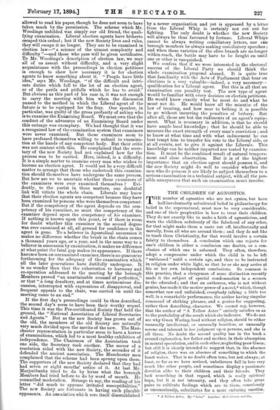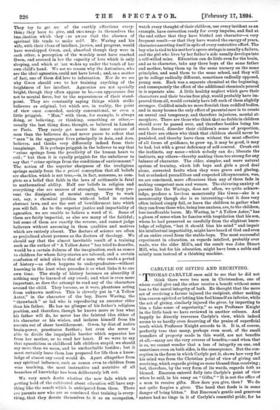THE CHILDREN OF AGNOSTICS.
THE number of agnostics who are not cynics, but have half-involuntarily substituted belief in philanthropy for belief in the supernatural, must now be very considerable, and one of their perplexities is how to treat their children. They do not exactly like to make a faith of agnosticism, and warn the children sedulously of the falsehood of any other, for that might make them a caste cut off, intellectually and morally, from all who are around them ; and they do not like to teach them Christianity, for that would involve a certain falsity to themselves. A conclusion which one rejects for one's children is either a conclusion one doubts, or a con- clusion of which one is ashamed. They often, therefore, adopt a compromise under which the child is to be left " unbiassed " until a certain age, and then to be instructed in religion under white light, so that he or she may arrive at his or her own independent conclusions. So common is this practice, that a clergyman of some distinction recently made it the subject of special condemnation in a sermon to the educated ; and that an authoress, who is not without genius, has made it the motive power of a novel,* which, though somewhat raw and unfinished, everybody talking a little too well, is a remarkable performance, the author having singular command of striking phrases, and a genius for suggesting, rather than describing, character. We cannot say, however, that the author of "A Yellow Aster" entirely satisfies us as to the probability of the result which she indicates. We do not see why Gwen Waring, bred without religion, should be either unusually intellectual, or unusually heartless, or unusually serene and tolerant in her judgment upon persons, and she is all three. No doubt the second quality has in the book a second explanation, her father and mother, in their absorption in mental speculation, and in each other, neglecting poor Gwen; but still it is clearly intended to suggest that, in the absence of religion, there was an absence of something to which the heart wakes. That is no doubt often true, but not always; at least, so far as we have noticed, unbelievers fall in love very much like other people, and sometimes display a passionate devotion alike to their children and their friends. They lack something in that regard, which is really spiritual hope, but it is not intensity, and they often take great pains to cultivate feelings which are to them, consciously or unconsciously, substitutes for a more enduring emotion.
• A Yellow Aster. By "Iota." London; ItutAinson and Co. They try to get ou- of the earthly affections every- thing they have to give, and enccurage in themselves the imagination which i hey i re awire that the absence of spiritual life tends to make col& Mr. Waring and his wife, with their ideas of intellect, justice, and progress, would have worshipped Gwen, and, absorbed though they were in each other, a perception of the worship must have reached Gwen, and aroused in her the capacity of love which is only sleeping, and which at !ast wakes up under the touch of her own child's hand. We see no reason why the Antonines, who are the ideal agnostics, could not have loved ; and, as a matter of fact, one of them did love to infatuation. Nor do we see why Gwen should owe to her training anything of the brightness of her intellect. Agnostics are not specially bright, though they often appear to be,—an appearance due not to mental force, but to the separateness of their stand- point. They are constantly saying things which strike believers as original, but which are, in reality, the point of -view once conceded, strictly conventional, or even a little priggish. "Man," with them, for example, is always doing, or believing, or thinking, something or other,— usually the last thing done, thought, or believed in London or Paris. They rarely get nearer the inner nature of man than the believers do, and never pause to reflect that " man " in the aggregate lives principally in Asia, and does, believes, and thinks very differently indeed from their imaginings. It is perhaps priggish in the believer to say that "crime springs from the proclivity of the human heart to evil ; " but then it is equally priggish for the unbeliever to say that "crime springs from the conditions of environment." The notion of the superior sharpness of the irreligious springs mainly front the a priori conception that all beliefs are shackles, which is not true,—is, in fact, nonsense, as com- plete as a belief that faith in the laws of arithmetic is fatal to mathematical ability. Half our beliefs in religion and everything else are sources of strength, because they pre- vent the dissipation of mental energy. Try to work out, say, a chemical problem without belief in certain abstract laws, and see the sort of bewilderment into which you will fall. As to the superior justice and impartiality of agnostics, we are unable to believe a word of it. Some of them are fairly impartial, as also are many of the faithful; but some of them are exactly the reverse, and cannot judge believers without assuming in them qualities and motives which are entirely absent. The doctors of science are often as prejudiced about persons as the doctors of theology. We should say that the almost inevitable result of a training such as the author of "A Yellow Aster" has tried to describe, would be a certain dulness of the imagination, such as comes to children for whom fairy-stories are tabooed, and a certain confusion of mind akin to that of a man who reads a period of history—as often happens to undergraduates—without knowing in the least what precedes it or what links it to our own time. The study of history becomes an absurdity if nothing may be learned of any creed; and what is even more important, so does the attempt to read any of the characters around the child. They become, as it were, phantoms acting from unknown motives. This is cleverly put in "A Yellow Aster," in the character of the boy, Dacre Waring, the " throwback " or lad who is reproducing an ancestor older than his father. He has no glimpse of his father's religious position, and therefore, though he knows more or less what his father will do, he never has the faintest idea either of his character or his wishes, and isolates himself from his parents out of sheer bewilderment. Gwen, by dint of native brain-power, penetrates further; but even she never is able to divide the impalpable barrier which separates her from her mother, or to read her heart. If we were to say that agnosticism in childhood left children stupid. we should say more than we mean, and be uncharitable besides ; but it must certainly leave them less prepared for life than a know- ledge of almost any creed would do. Apart altogether from any spiritual influence, such as comes even to children from wise teaching, the most instructive and nutritive of all branches of knowledge has been deliberately left out.
We very much doubt whether the new fads which are getting hold of the cultivated about education will have any- thing like the result which is anticipated from them. There are parents now who are so convinced that training is every- thing, that they devote themselves to it as an occupation,
watch every thought of their children, use every incident as an example, have correction ready for every impulse, and find at the end either that they have blotted out character—a very frequent result—or that they have wasted the energy of years, character asserting itself in spite of every restrictive effort. The boy who is tied to his mother's apron-strings is usually a failure, and the girl who lives by her father's side usually develops into a self-willed minx. Education can do little even for the brain, and as to character, take any three boys of the same father and mother, bring them up in the same nursery on the same principles, and send them to the same school, and they will go to college radically different, sometimes radically opposed, young men. Each was a separate chemical at the beginning. and consequently the effect of the additional chemicals poured in is separate also. A little healthy neglect which gave their characters and their brains free play, would probably have im- proved them all, would certainly have left each of them slightly stronger. Coddled minds no more flourish than coddled bodies, and in many houses the only effect of parental care is to create an unreal and temporary, and therefore injurious, mental at- mosphere. There are those who think that no foible in children should ever be passed over, and therefore besides being too much feared, disorder their children's sense of proportion, and there are others who think that children should never be punished, and thereby leave them without the most effective of all forms of guidance, to grow up, it may be good, it may be bad, but with a great deficiency of self-control. Crush out the instincts, say some—which nobody can do ; liberate the instincts, say others—thereby making them too strong for any balance of character. The older, simpler, and more natural system of training, which left boys and girls a good deal alone, corrected faults when they were grave and glaring, but overlooked peccadilloes and respected idiosyncrasies, was, we are convinced, more efficacious than any of these fads in making competent men and women. The shivering anxiety of parents like the Warings, does not often, we quite acknow- ledge, produce a loveless monstrosity like Gwen—she is a monstrosity though she is so interesting—but it does very often indeed simply fail, or leave the children to gather what they can from those who, being less anxious, are, to the children, less insufferable bores. Mr. Waring, in " A Yellow Aster," has a gleam of sense when he fancies with trepidation that his son, whom be had preserved so carefully from the slightest know- ledge of religion, "lest it should bias his mind" and impair his intellectual impartiality, might have heard of God and even of an entire creed from the stable-boys. The most successful experiment in education, as regards intellect, probably ever made, was the elder Mill's, and the result was John Stuart Mill, who, but for his education, might have been a noble and saintly man instead of a thinking machine.







































 Previous page
Previous page